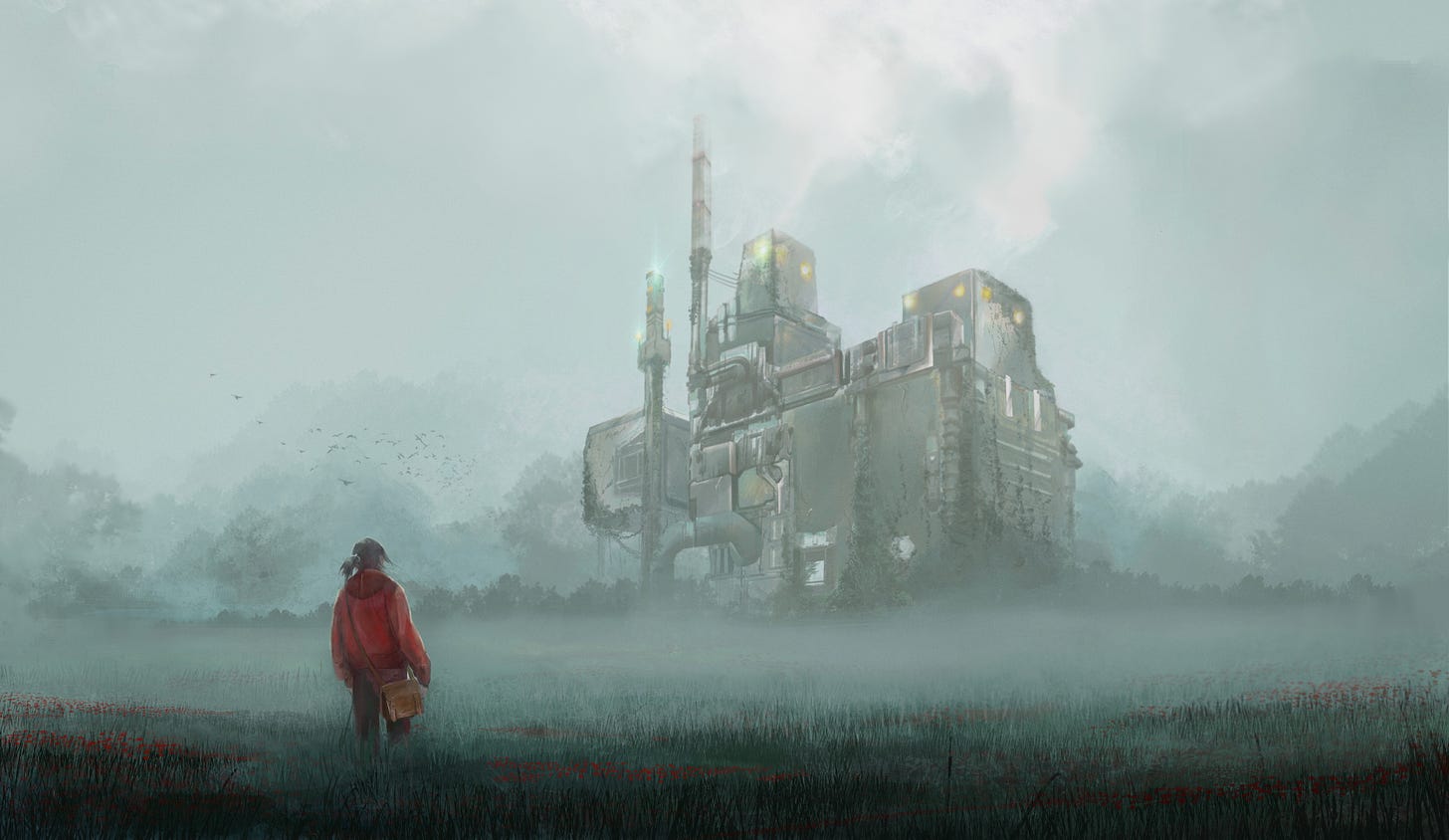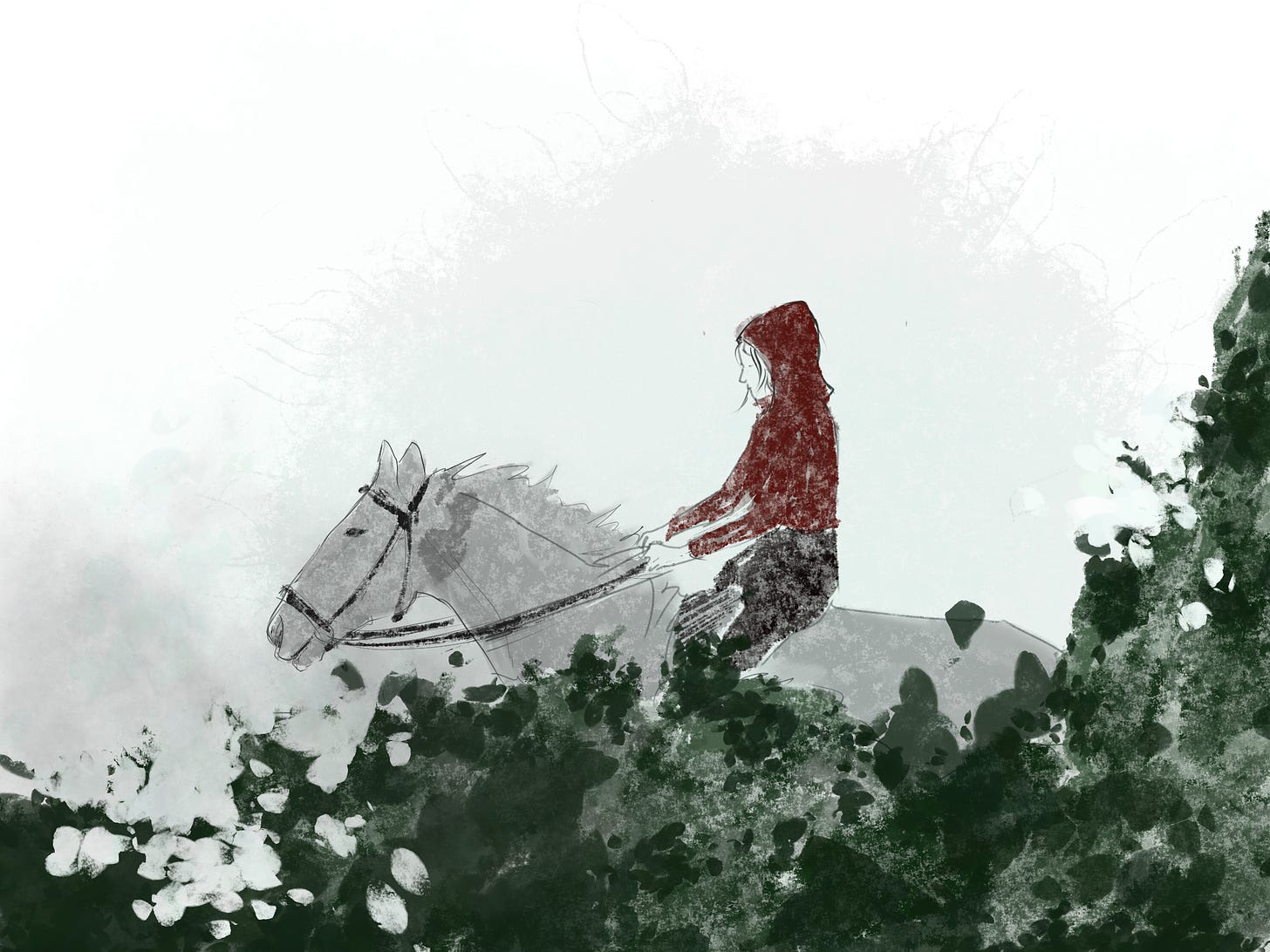Chapter 15
After pressing a letter into the hands of the old woman and begging her to pass it along to the next traveler who passed by, she set off. Riding was hard, harder than she remembered, and for a while she was convinced that she had made a terrible mistake. Though she was happy to get off of her aching feet, the saddle hurt worse, and the constant jolts and shakes gave her a headache. She was quickly tired of tugging her reluctant transportation in the direction she wanted to go, and sat in frustration as he would occasionally decide to stop and graze. But perhaps worst was the exposure. For someone who had spent a life flitting unseen across the landscape, to be moving around through unfamiliar territory sitting five feet up was discomfiting.
Still, after traveling 30 kilometers in a day, she could not resist the conclusion that she had made the right call. As she sagged in the saddle, she began to realize how much the past weeks had taken out of her, how much time she had spent under the influence of adrenaline and fear. Now on the road again there was little to do but come to terms with the war of attrition going on in her own body. And so she found herself saying thanks for her companion even when at his most obstinate. What she would do with the horse in the long run, she couldn’t say. She found that she had stopped thinking about the future, in any real sense, beyond saving Long Fei. Perhaps her horse would some day give her the life she desired, a life in motion, free to roam far from her village and the people she loved and resented. But every stray thought of what she would do when she was free ran headlong into the daunting reality of her task now. In a few days her past life at home had come to seem like a distant memory, and her future was entirely unclear. It was not an entirely unpleasant feeling.
As she rode she occasionally passed other people. She had learned long ago that there was no such thing as an average person, outside of the villages and shanty towns; everyone who took to the open world for travel or to live had been blown there by their own unique circumstances. She came up alongside a young couple, not much older than herself, hiking steadily along a worn path, the woman toting a young toddler on her chest, the man hauling a tarp and pack on his back. They waved hello and complimented her on her horse, and as she thanked them and rode slowly away, she ached for their companionship, for some human connection. But there was no time to stop, and she knew better than to trust appearances. Mostly, the people she saw were typical of the outside, half-deranged survivalists, eking out an existence from what they could scavenge, eating wild vegetables and drinking stagnant water. She wished she could offer them something to eat; she wished she had more to eat herself. She searched for optimism and could only be thankful that the people she saw were too damaged to be a threat to her.
She would make camp in glades and gullies, looking for patches of dry earth to settled down on. The old woman had thrown in a big bag of oats, for the good of the horse, of course, not for Haojing. When they came upon a stream they would both drank. In these quiet moments he thought of all things and when she thought she would count the syllables of her thoughts on her fingers. Occasionally her thoughts would lead her to thinking of her mother and then she would have to put thinking away.
At night she slept fitfully, waking frequently to check and see if the horse had fled in the night, but each time she found him tied securely to the trees where she had left him. She had the vague desire to reach out and touch his hooves, to make sure he was corporeal, to see if he was really there.
Chapter 16
She saw the pillar of smoke a full half-day before she was close enough to get a good look at the geography of her destination. The visuals were ominous enough, but Haojing was preoccupied with what it meant for her mission. Everything in Big Flat’s files suggested that the Colony was a fairly clandestine affair, grassroots and small footprint. The kind of encampment that would generate such smoke would have to be among the largest she had ever seen. But the closer she got, the clearer it became that she was headed more or less straight for it. And so for the thousandth time she wondered if she had gotten something wrong, if the whole journey had been misguided.
Now she was staring down from the crest of a ridge that overlooked the broad expanse before her, trying to comprehend what was below. It had taken her several hours out of her path, but with the smoke looming larger ahead of her, she felt she needed to get up high and see what she was walking into. It took ages to coax her horse up some of the steeper terrain, and at times she seriously considered letting him go. But finally she succeeded in half dragging him up the rockier bits, and now she stood next to him, his reins clutched tightly in her grasp as she peered at the landscape in front of her. He whinnied and shuffled his feet in anxiety, and for once she knew just how he felt.
On the plain below her sat a large encampment, easily four times the size of her own village in acreage. Surrounding it was a vast wall, probably 20 meters tall. From her distance it was hard to tell its materials, but judging by its mottled texture and uneven colors it was probably assembled from a vast array of disparate metals, anything that could have been beaten into a vaguely flat shape and stitched into place. The effort would have been extraordinary, both in terms of scavenging and construction, and such effort worried her. Such construction meant enormous amounts of manpower and such manpower probably meant coercion, even slavery.
But it was the smokestack that really demanded her attention. It stretched up into the sky, far taller than the wall. This, she was sure, was premade, a relic of an earlier time. No amount of slave labor would have been sufficient to craft something so tall, or so perfectly round. The settlement around it must have come together to take advantage of this quirk of architecture and history; the maps she had seen had shown no large pre-collapse population center. Had the Colony built this? Had they themselves been enslaved by some warlord looking for manpower? Or could this possibly be some outpost of democracy, a bastion of civilization? And how had she never heard of such a place? She thought of those rumors of vast, advanced cities and tried to counter her own hopes. If nothing else, the scale of what she saw in front of her was impressive. But no matter how she turned things over in her mind, it didn’t seem like good news for her task.
The fuel that produced all that smoke – and it must have taken an immense fire indeed – was obvious. To the east of the encampment, just outside of the wall, the forest had been clear-cut. From here it looked like a scar of brown in the green fabric of the world, and it stretched farther and farther into the distance. She could dimly make out movement in that dirty landscape, tree trunks moving slowly towards the settlement. She shuddered to think of the conditions for those who hauled so much timber.
For a while she debated internally, feeling a growing sense of despair. She had no desire to enter the settlement, which looked imposing and grim, and didn’t know if she could get entry even if she wanted to. She kept looking to the clear-cut forest, squinting to make out the people that crawled around in it, performing their difficult labor. To end up captured and subjected to physical slavery, or worse, and unable to save Long Fei from the Sanhedrin or his illness, watching the days pass without knowing if he was alive or dead…. And she was afraid of what would happen to her horse while she was down there.
Relief came in the form of another, much smaller settlement. She spotted it some half a kilometer from the wall, sitting nestled up in a crook of a river. There was no way the two settlements could be unaware of each other; for all she knew it was merely an outpost of the larger Colony. But its existence still gave her hope. Perhaps they merely traded with each other. Perhaps it was an entirely independent entity. Either way, it gave her what she needed desperately in that moment: it gave her another option.
She took a moment to stroke the side of the horse’s face, feeling the gaze of his black eyes on her, then gave his reins a tug, and led him downhill towards the river.
Table of Contents and instructions for subscribing to just this serialized novel here. Illustrations by Vika S. If you enjoy this novel, consider leaving a tip. Tips will be split equally between the author and illustrator. Sign up for fredrikdeboer.substack.com here.
©2019 Fredrik deBoer






